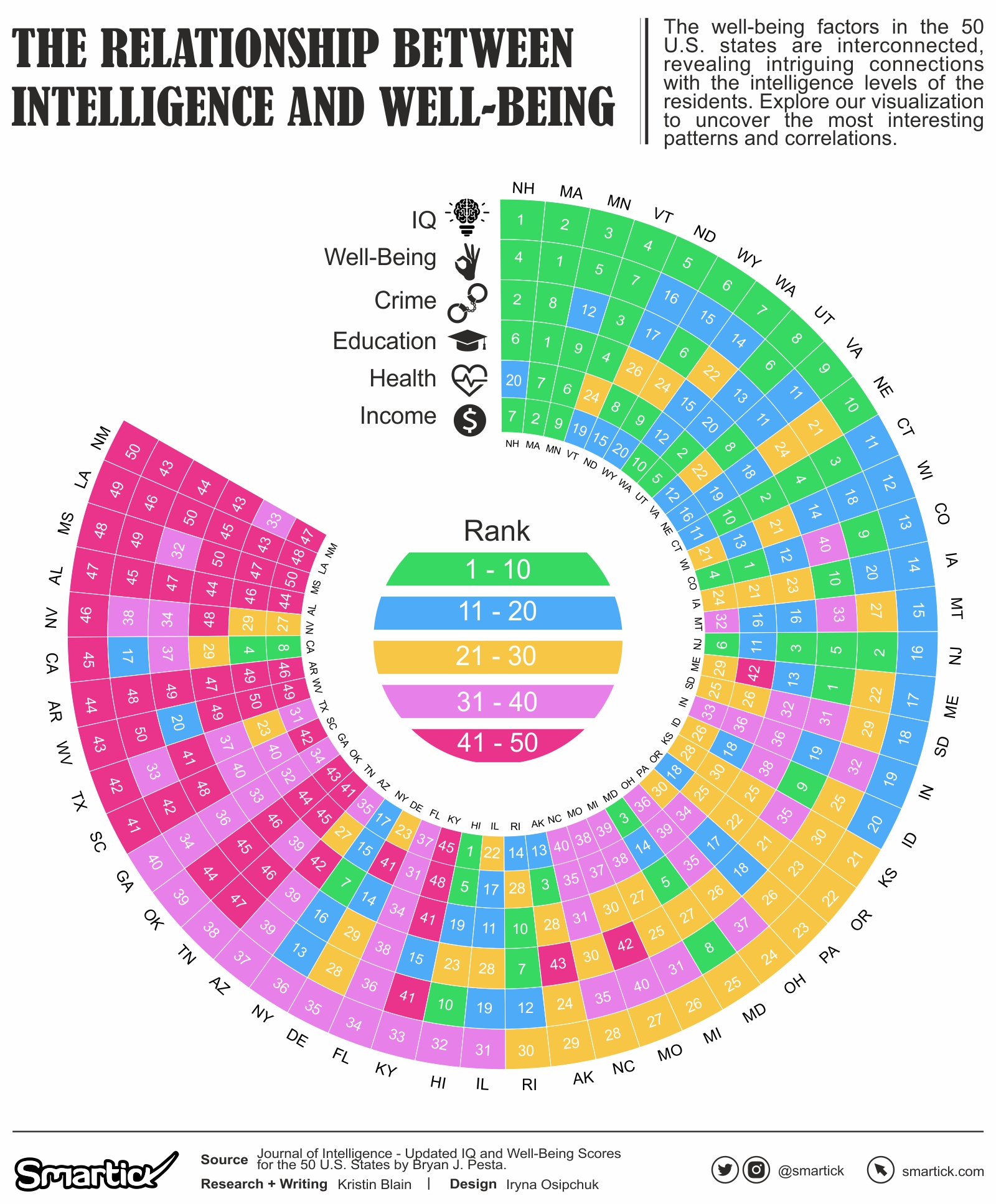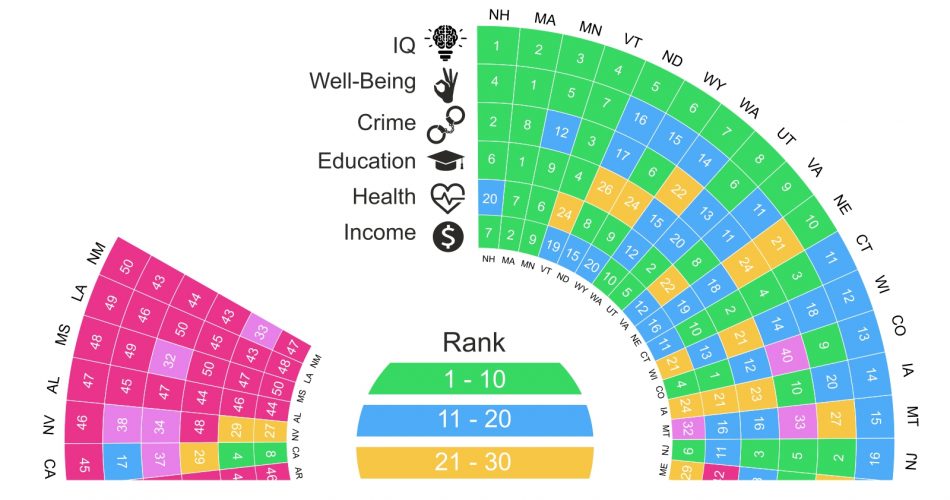
Ever wondered how a state’s smarts could influence its overall well-being? That’s exactly what we’re diving into. We’re here to explore the connections between state intelligence (IQ) and the things that matter—like crime, education, health, and income. Get ready for a journey through the numbers, unveiling the secrets behind why intelligence plays a crucial role in shaping our states.

Connecting the Dots: How State IQ Aligns with Well-Being Variables
Analyzing the correlations between state IQ and various crucial factors such as well-being, crime, education, health, and income paints a nuanced picture of the interconnected dynamics shaping the prosperity of states. Notably, higher IQ states tend to exhibit positive correlations across these domains. For instance, Massachusetts emerges as a consistent frontrunner, aligning with higher intelligence ranks and claiming top positions in well-being, education, income, and even holding a noteworthy position in health. Conversely, states like Mississippi, with lower IQ rankings, often deviate from the expected correlations, indicating potential challenges in these domains. This intricate web of correlations underscores the broad influence of intelligence on state-level outcomes, shedding light on how cognitive abilities interplay with fundamental aspects of societal well-being.
Intelligence and Well-Being: Unraveling the Intricate Connection Across States
As we navigate the correlations between state IQ and well-being, a fascinating pattern emerges from the data. States with higher IQs generally exhibit a positive correlation with well-being scores, showcasing a significant trend that links intelligence levels to overall societal welfare. For instance, Massachusetts, holding the top spot in state IQ, also claims the highest well-being rank. In contrast, states like Mississippi, with lower IQ rankings, find themselves towards the lower spectrum of well-being scores. This consistent alignment suggests that as a state’s intelligence quotient rises, so does its well-being, uncovering a compelling association between cognitive abilities and the broader aspects of societal prosperity.
Intelligence and Public Safety: Decoding the Dynamics Between State IQ and Crime Rates
Examining the correlation between state IQ and crime rates reveals intriguing insights into the relationship between intelligence and public safety. Notably, states with higher IQs tend to exhibit a negative correlation with crime, suggesting that as intelligence levels rise, crime rates tend to decrease. Massachusetts, holding a commendable second spot in state IQ, aligns with this trend, showcasing both high cognitive abilities and a lower crime rank. On the contrary, states like Louisiana, with lower IQ rankings, deviate from the expected correlation, presenting higher crime rates. This consistent pattern underscores the intricate interplay between state intelligence and the maintenance of public order.
The Intelligence-Education Nexus: Unraveling the Bonds Between State IQ and Academic Achievements
Analyzing the correlation between state IQ and educational metrics offers a nuanced perspective on the relationship between intelligence and academic achievements. Notably, states with higher IQs tend to exhibit positive correlations with educational metrics, suggesting that higher intelligence levels align with enhanced education levels. Massachusetts, securing an impressive second spot in state IQ, aligns with this positive correlation, showcasing both high cognitive abilities and a top-tier education rank. In contrast, states like Louisiana, with lower IQ rankings, deviate from the expected correlation, presenting lower education ranks. This consistent pattern highlights the intricate interplay between state intelligence and the pursuit of academic excellence.
The Intelligence-Health Harmony: A Deep Dive into the Correlation Between State IQ and Overall Well-Being
Exploring the correlation between state IQ and health metrics unveils intriguing insights into the relationship between intelligence and well-being. States with higher IQs tend to exhibit positive correlations with various health indicators, suggesting that higher cognitive abilities align with better overall health. For instance, Colorado, securing a remarkable 13th spot in state IQ, stands out with an impressive top-ranking in health. This positive correlation signifies a connection between higher intelligence levels and healthier populations. Conversely, states like Mississippi, with lower IQ rankings, deviate from the expected correlation, presenting lower health ranks. This pattern highlights the complex interplay between state intelligence and the well-being of its residents.
The IQ-Income Nexus: Unraveling the Link Between State Intelligence and Economic Prosperity
Examining the intricate relationship between state IQ and income levels unveils compelling patterns that suggest a strong correlation between intelligence and financial prosperity. States with higher average IQ scores tend to exhibit robust positive correlations with income, implying that regions with more cognitively adept populations also tend to enjoy higher economic well-being. Massachusetts, holding the second-highest state IQ rank, also claims the top spot in income, reinforcing the notion that higher intelligence fosters economic success. In contrast, states like Mississippi, with lower IQ rankings, deviate from the expected correlation, presenting lower income ranks. This alignment between state intelligence and income underlines the multifaceted impact of cognitive abilities on the economic landscape and the financial well-being of residents.
Crafting the Nexus: Methodology Behind State IQ and Well-Being Analysis
Understanding the correlations between state IQ and well-being requires a methodical approach. Dr. Bryan J. Pesta compiled new state IQ estimates by analyzing scores from the Program for the International Assessment of Adult Competency (PIAAC) for adults and the National Assessment of Educational Progress (NAEP) for fourth and eighth-grade children. To update the well-being landscape, we created global well-being scores by analyzing state variables from the subdomains of crime, income, health, and education.
For state IQ, the synthesis involved PIAAC Literacy and Numeracy scores (2012–2017) and NAEP Reading and Math scores (2015, 2017, and 2019). The reliability of the state IQ estimates proved high, echoing the robustness of McDaniel’s original IQ estimates. Our method extends beyond numbers, aiming to capture the essence of intelligence’s impact on well-being variables at the state level. The stage is set; let’s unfold the intricacies of our methodology.
Summing Up the Puzzle: State IQ’s Role in Shaping Our Future
As we wrap up our exploration into the fascinating interplay between state intelligence (IQ) and well-being, a clearer picture emerges of how a state’s smarts influence its overall prosperity. From crime rates to income levels, education metrics to health indicators, the correlations underscore the significant role intelligence plays in shaping the fabric of a state’s well-being.
Our journey through the correlations has unraveled intriguing patterns, showcasing the negative correlation between high IQ states and crime rates, exemplified by states like Massachusetts and New Hampshire. The positive links between state IQ and education levels, health indicators, and income levels further highlight the pervasive impact of intelligence on the fundamental pillars of well-being.
Behind these revelations lies a meticulous methodology crafted by Dr. Bryan J. Pesta, utilizing a blend of adult competency assessments and educational progress scores. This method, beyond mere numerical analysis, seeks to capture the essence of how intelligence resonates across various well-being variables at the state level. In decoding this nexus, we not only illuminate the dynamics of state IQ but also set the stage for informed policymaking, recognizing intelligence as a central node in the intricate network of well-being variables.

